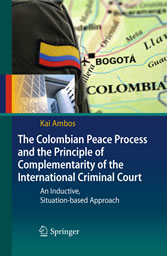Suchen und Finden
Mehr zum Inhalt

The Colombian Peace Process and the Principle of Complementarity of the International Criminal Court - An Inductive, Situation-based Approach
Preface
6
Contents
8
Abbreviations
12
Chapter 1: Preliminary Remarks
17
Chapter 2: The Process Under Law 975
25
2.1 Demobilization, disarmament and reintegration
26
2.2 Preliminary investigation and ``versión libre´´
28
2.3 Formulation of ``imputation´´ and charges
31
2.4 Reparation
35
2.5 Determination of the sentence
37
Chapter 3: Intermediate Conclusions
39
Chapter 4: Preliminary Considerations: The Object of Reference of the Complementarity Test (Situation-Case-Conduct)
50
Chapter 5: Gravity and Complementarity Stricto Sensu
55
5.1 Sufficient gravity (Art. 17 (1) (d))
56
5.1.1 The standard in current practice
56
5.1.2 The own approach
60
5.1.3 Application to the situation in Colombia
63
5.2 Complementarity stricto sensu
66
5.2.1 Admissibility due to total State inaction
67
5.2.1.1 General considerations
67
5.2.1.2 Application to the situation in Colombia
69
5.2.2 Inadmissibility due to State action (Art. 17 (1) (a)-c) and 20 (3))
71
5.2.2.1 General considerations
71
5.2.2.2 Application to the situation in Colombia
75
5.2.3 Admissibility due to unwillingness or inability (Art. 17 (2) and (3))
75
5.2.3.1 Preliminary remarks
75
5.2.3.2 Unwillingness
78
5.2.3.2.0 General considerations
78
5.2.3.2.0 Application to the situation in Colombia
84
Purpose of shielding
84
Unjustified delay
85
Independent and impartial proceedings
87
General and paradigmatic aspects
88
5.2.3.3 Inability
92
5.2.3.3.0 General considerations
92
5.2.3.3.0 Application to the situation in Colombia
95
Chapter 6: Conclusion: Classifying the Colombian Case with a View to Different Transitional Justice Scenarios
100
Chapter 7: Some Recommendations for the Further Application of Law 975
102
Documents and Materials
107
1. Additional Sources*
107
1.1 NORMATIVE FRAMEWORK
107
1.1.1 Legislation
107
1.1.2 Executive Decrees
108
1.1.3 Resolutions, agreements, memoranda and others
108
1.1.3.1 Resolutions and memoranda Fiscal ´a General de la Nacio´n
108
1.1.3.2 Resolutions Presidencia de la Repu´ blica
109
1.1.3.3 Resolutions and agreements of governmental departments
110
1.1.3.4 Consejo Superior de la Judicatura
110
1.1.3.5 Procuradur ´a General de la Nacio´n
111
1.1.3.6 Defensor ´a del Pueblo
111
1.1.3.7 Others
111
1.2 JURISPRUDENCE
111
1.2.1 International Jurisprudence
111
1.2.1.1 International Criminal Court
111
1.2.1.2 Inter-American Court of Human Rights
112
1.2.1.3 Resolutions of other international courts
113
1.2.2 Colombian Jurisprudence
113
1.2.2.1 Corte Constitucional
113
1.2.2.2 Corte Suprema de Justicia
114
1.2.2.3 Consejo de Estado
115
1.2.2.4 Tribunal Superior de Justicia y Paz de Bogota
115
1.3 DOCUMENTS
116
1.3.1 Governmental documents
116
1.3.1.1 Oficina del Alto Comisionado para la Paz
116
1.3.1.2 Comisio´n Nacional de Reparacio´n y Reconciliacio´n
116
1.3.1.3 Ministerio de Defensa
117
1.3.1.4 Procuradur ´a General de la Nacio´n
118
1.3.1.5 Defensor ´a del Pueblo
118
1.3.1.6 Other govermental documents
118
1.3.2 International and non-governmental organizations
119
1.3.2.1 Inter-American Commission on Human Rights
119
1.3.2.2 Centro de Investigacio´n y Educacio´n Popular
120
1.3.2.3 Fundacio´n Ideas para la Paz
120
1.3.2.4 Other documents
121
1.3.2.5 Unpublished documents
123
1.3.3 Press reports
124
1.4 (Further) BIBLIOGRAPHY
126
1.4.1 Monographs/Books
126
1.4.1.1 International criminal law, transitional justice, peace process,demobilisations and related topics
126
1.4.1.2 Law 975 of 2005
130
1.4.2 Articles in journals/books
131
1.4.2.1 International criminal law, transitional justice, peace process,demobilisation and related topics
131
1.4.2.2 Law 975 of 2005
134
1.5 FIELD WORK: INTERVIEWS AND MEETINGS
134
1.5.1 Interviews
134
1.5.2 Meetings
135
2. LAW NO. 975, 25 JULY 2005
138
CHAPTER I
138
Principles and definitions
138
CHAPTER II
141
Preliminary aspects
141
CHAPTER III
142
Procedural principles
142
CHAPTER IV
143
Investigation and prosecution
143
CHAPTER V
148
Alternative Sentence
148
CHAPTER VI
148
Regime for the deprivation of liberty
148
CHAPTER VII
149
Institutions for the execution of this law
149
CHAPTER VIII
150
Rights of victims with respect to the Administration of Justice
150
CHAPTER IX
152
Right to reparation for the victims
152
CHAPTER X
155
Conservation of archives
155
CHAPTER XI
156
Humanitarian Accords
156
CHAPTER XII
156
Entry into force and complementary provisions
156
3. . Schematic Overview of the Procedure Under Law 975
159
4. Bibliography
160
4.1 Monographs and Books
160
4.2 Articles in journals/books
161
4.3 Papers and other documents
165
Alle Preise verstehen sich inklusive der gesetzlichen MwSt.








